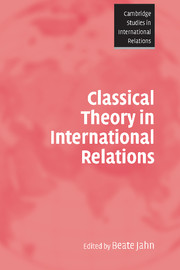Book contents
- Frontmatter
- Contents
- Notes on contributors
- Acknowledgements
- 1 Classical theory and international relations in context
- Part I Intellectual contexts
- 2 Pericles, realism and the normative conditions of deliberate action
- 3 Immanuel Kant and the democratic peace
- 4 ‘One powerful and enlightened nation’: Kant and the quest for a global rule of law
- 5 Rousseau and Saint-Pierre's peace project: a critique of ‘history of international relations theory’
- Part II Political contexts
- Part III Lineages
- Index
- CAMBRIDGE STUDIES IN INTERNATIONAL RELATIONS
2 - Pericles, realism and the normative conditions of deliberate action
Published online by Cambridge University Press: 22 September 2009
- Frontmatter
- Contents
- Notes on contributors
- Acknowledgements
- 1 Classical theory and international relations in context
- Part I Intellectual contexts
- 2 Pericles, realism and the normative conditions of deliberate action
- 3 Immanuel Kant and the democratic peace
- 4 ‘One powerful and enlightened nation’: Kant and the quest for a global rule of law
- 5 Rousseau and Saint-Pierre's peace project: a critique of ‘history of international relations theory’
- Part II Political contexts
- Part III Lineages
- Index
- CAMBRIDGE STUDIES IN INTERNATIONAL RELATIONS
Summary
Thucydides' History of the Peloponnesian War has lost none of its power to fascinate. We are excited by the keen analysis, the apparent accessibility of the actors to rational interpretation, the ring of familiarity in the events the historian recounts. Above all, we are excited by Thucydides' claims to have written a work that will become ‘a possession for all time’, a work that we will ‘judge useful’ (I.22.4). But useful how? As good counsel, a theory, an example to avoid (if so, how)? Having treated Thucydides as a forerunner of modern realism, International Relations scholars today better appreciate the complexity of his text and often challenge the Realist reading. Political Theorists have also turned to the text in growing numbers, interrogating its pessimism, its pervasive humanity, its subtle critique of democracy, its account of the fragility of political unity or its analysis of the tension between love of glory and commitment to the common good.
The variety of reactions and interpretations elicited by the text confirms the observation of a leading classicist that Thucydides forever proves resistant to paraphrase and summation. That resistance owes much to Thucydides' pervasive use of antithesis as a tool of analysis. Antithesis in the form of paired speeches (e.g. Cleon and Diodotus) and dramatic juxtapositions (e.g. the Periclean funeral oration and the plague narrative) is well known. But the presence of antithesis in the treatment of Pericles, a part of the text usually thought to exhibit a more straightforward teaching, has commanded less attention.
- Type
- Chapter
- Information
- Classical Theory in International Relations , pp. 27 - 51Publisher: Cambridge University PressPrint publication year: 2006



